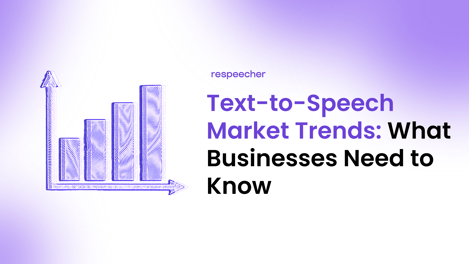What Is Voice Marketing and Why You Need to Use It

Back in 2019, analysts at Gartner predicted that 100 million consumers would shop in augmented reality by 2020.
This is paired with the prediction that 30% of web browsing sessions will be carried out without a screen.
In 2021, we can observe that their predictions have come true. With the increasing role of synthetic media, augmented reality, and podcasts, voice marketing has expanded into overall marketing.
But what is voice marketing? And why is it crucial for business?
What is voice marketing?
Voice marketing is comprised of a set of tactics and tools that businesses use to market their services and products across voice platform ecosystems.
For example, the latter include Alexa and Google Assistant but are not limited to these platforms. Smart TVs, watches, numerous home devices, and cars can all interact with humans using voice assistants.
There are four areas where the development of voice marketing is most prevalent:
- Voice ads that are distributed via podcasts and voice-enabled home devices.
- Sonic branding. This is a relatively new form of marketing that involves a company creating their own audio assets associated. Listeners are then getting used to them and the company can embed these assets into other mediums. Imagine you hear a well-known iPhone ringtone or Windows startup sound. You immediately know which company these sounds are related to.
- Podcasts. Podcasts continue to gain popularity, with a significant increase in the number of active US listeners from 82 million in 2021 to approximately 100 million in 2022, according to Supplygem. This impressive growth of roughly 20% shows that more people are tuning in to this form of media, which is known for its engaging and informative content.
- Voice search optimization. This means that your site should provide quick answers to questions rather than storytelling. Why? Because when a user asks for voice assistance, they do not want to listen to an audiobook in return. Answers should be quick and to the point. Create your content while keeping in mind that only the ear can perceive it.
Things to consider before creating your voice marketing strategy
Before spending your marketing budget, you need to figure out which type of audio content is best for you. You can work with podcasts (although not everyone does it well) and spend money on audio ads. These forms of marketing are perhaps the most common.
Podcasts
Podcasting is pretty hard as you have to maintain the same editorial calendar as you would when blogging. But the topics need to be much more engaging and the scripts have to be longer.
That is because there are significant differences between the perception of audio and text content. A person can scan an entire text and quickly identify the things that matter most to them. Whereas with audio content, this will not work.
We listen to the podcast with no idea what's next. If a person’s attention isn’t captured within the first minutes, there's zero chance they will come back later.
And just think about how much text content and research you need to prepare before creating a podcast. Not everyone can work in Joe Rogan's free flow format. For most businesses, preparing an hourly broadcast requires dozens of hours of preparation behind the scenes.
However, if you can be unique, a podcast is a good investment for your marketing strategy. In 2021, podcasts are still fresh. And according to Marketing Week, 61% of listeners purchased a product or service after hearing about it on a podcast. With the advancement of technology like voice cloning for podcasts, you can further enhance the appeal and engagement of your podcast content.
Voice search marketing
What is really important is voice search marketing. And this one lies at the core of your future strategy. Forty-six percent of Americans use Siri, Alexa, and Cortana for daily searches. According to Goole, 27% of the online global population is using voice search on mobile.
What does that mean for your business
Well, about 75% of voice searches will rank in the top 3 spots for a specific question on a traditional web search. That means that if you aren't high enough to make the first three spots of Google search, it will be almost impossible to get any "listener traffic."
In the new world of voice search, the most potent brands will either win or those that optimize their sites the best will reap the rewards of this emerging trend.
In short, voice search works like this:
- A person asks their voice assistant a simple query. It's usually longer than the same query would be in text. For instance, "Ok Google, score for Longview vs. Waco midway."
- Google then typically takes the first search result and reads it with its remarkable Google Assistant voice.
- Next, if there's an upcoming game between these two teams, Google can offer to order tickets on the league website. You can either accept or reject the offer.
This example is now applicable to almost any sphere of e-commerce or online services. You can search for a service provider and order goods without having to browse the web.
How is synthetic speech changing the voice marketing game?
Now let's take a closer look at sonic branding. Sonic branding is to your brand what graphic branding was in traditional marketing.
It is that novel combination of colors and style that is unique to your company. Some memorable jingles, a mixture of sounds when entering a website -- it can be anything you like. But the most important thing is the authentic voice of your brand.
Your brand can speak the language of a celebrity, or maybe you want to invent your own unique voice. In any case, speech-to-speech (STS) voice conversion, powered by generative AI, can be a game-changer.
For a better understanding of voice cloning technology, we at Respecheer try to answer all the questions about speech-to-speech voice conversion on our FAQ page.
Synthetic voices are now indistinguishable from the voice of an actual person. This means that if you signed with David Beckham and licensed his voice for advertising campaigns, you can generate unlimited content without involving the famous athlete himself. Only a few hours of recording his original voice are needed to synthesize endless hours of speech using an AI voice generator.
In case that the original recording suffer from quality issues of all kinds or it is a very old one, Respeecher built an audio version of the super resolution algorithm to deliver the highest resolution audio across the board. Discover more by downloading this audio super-resolution whitepaper.
You can also create a unique voice for your brand from scratch. Doing so means that it will not belong to any person, and from a legal perspective, this voice will be your intellectual property. AI voices allow you to craft distinct vocal identities tailored specifically to your brand's needs. The benefits are obvious:
- It's inexpensive. Plus, you can now license these types of voices on our newly launched Voice Marketplace.
- You will never depend on specific people to voice your media campaigns. You don't have to adjust to someone's schedule or put up with individual demands.
- A synthetic voice can stay with your brand for decades, which will play a key role in its widespread recognition.
- You can easily localize your synthetic voice to dozens of other languages. The AI technology underlying speech synthesis does not care what language the text is spoken in. Therefore, while your potential David Beckham speaks English today, tomorrow he can speak Mandarin without an accent. Moreover, this voice matches the characteristics of the voices of native speakers, no matter what language it is speaking.
Synthetic voice generation goes hand in hand with the use of deepfake tech in marketing. By combining both technologies, you can utilize AI voice generators to generate fully synthetic video content for your brand, as well as significantly unload your brand ambassadors and production studios.
Where to start with your voice marketing assets?
Contact us. Respeecher, the forefront innovator in voice cloning technology, maintains a solid track record when it comes to working with leading advertising agencies, Hollywood Studios, and even prominent YouTube vloggers. Our AI voices have been utilized in a wide range of projects, from commercial advertisements to blockbuster films, showcasing the versatility and quality of our technology.
We help companies find and synthesize their unique voices and generate audio content based on their brand ambassadors' voices. With the assistance of our AI voice generator technology, we can also help you if you are just testing the waters of this emerging marketing trend.
FAQ
Voice marketing leverages AI-powered voice tools like voice search marketing and synthetic speech to promote brands on voice platforms such as Alexa and Google Assistant.
Synthetic speech allows brands to create custom AI voices for marketing, enabling sonic branding, cost-effective voice cloning, and scalable content for ads and campaigns.
Sonic branding uses distinctive audio assets, powered by AI-generated voices and synthetic speech, to build memorable brand identities, reinforcing recognition through sound.
Brands can optimize for voice search marketing by ensuring fast, concise answers for voice queries, enhancing visibility on voice assistant platforms like Google Assistant and Alexa.
Voice cloning enables brands to replicate unique voices, offering scalable, personalized content creation for podcasts, ads, and customer interactions, enhancing brand voice consistency.
Synthetic speech boosts podcast content by enabling scalable, AI voice generation for consistent voiceovers, enhanced audio resolution, and multi-language localization without high costs.
When used ethically, synthetic speech can provide safe, efficient content creation. Brands must ensure they follow ethical AI applications and secure voice licensing agreements.
Voice marketing enhances e-commerce by streamlining customer interactions via voice search marketing and AI voice generators, improving user experience and conversion rates.
Brands must secure license agreements for voice cloning, ensuring they have permission to use voices in marketing, and adhere to ethical AI applications to avoid misuse.
Brands can create a custom synthetic voice by using AI voice generators, allowing them to craft a unique vocal identity for sonic branding and maintain control over their brand voice.
Glossary
Voice marketing
A strategy using AI voice generators, synthetic speech, and voice cloning to enhance sonic branding, voice search marketing, and personalized audio content.
Synthetic speech
AI-generated speech-to-speech technology and voice cloning used in voice marketing, sonic branding, and voice search marketing for personalized, clear audio content.
Sonic branding
The use of AI voice generators and synthetic speech to create unique audio identities for brands in voice marketing, enhancing recognition through sound.
Voice search marketing
AI voice generator
A tool that creates synthetic speech for voice marketing, enabling voice cloning, speech-to-speech technology, and sonic branding with synthetic voice generation.
Speech-to-speech technology (STS)
A method that enables voice cloning and synthetic speech, enhancing voice marketing, AI voice generation, and sonic branding with audio super resolution.
Voice cloning
The process of replicating a person's voice using AI voice generators, enabling synthetic speech, voice marketing, sonic branding, and speech-to-speech technology.
Audio Super Resolution
Synthetic Voice Generation
creation of artificial voices using AI technology, essential for Voice marketing, Sonic branding, and Voice search marketing. It involves Speech-to-speech, Voice cloning, and Audio super resolution techniques.
Conversational UX
involves enhancing user experience through Voice marketing, AI-generated Synthetic speech, Sonic branding, and Voice search marketing for engaging interactions using Speech-to-speech tech, Voice cloning, Audio super resolution, and Synthetic voice generation technologies.

- voice cloning
- synthetic media
- artificial intelligence
- AI voice synthesis
- artificial intelligence (AI)
- deepfake marketing
- digital marketing
- advertising
- voice cloning technology,
- podcast production
- sonic identity
- voice marketing
- audio branding
- sonic branding
- voice search marketing
- AI voices
- AI voice generator
- generative AI
- voice cloning for podcasts


.png?width=477&height=264&name=Text-to-Speech%20Market%20Trends_%20What%20Businesses%20Need%20to%20Know%20(1).png)


